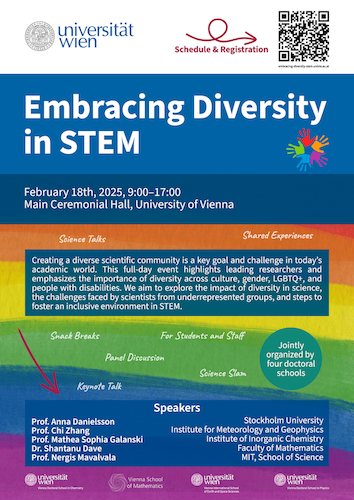Big Picture Talks and Events
Aiming to see the Big Picture
With the "Bic Picture" talk series organized by VISESS PhD students, the doctoral school aims to present current topics of scientific and societal interest to the wider scientific community and the public. There are up to three Big Picture talks per year. Teams of PhD students of all three branches of the doctoral school plan and host the invitation of (international) experts on interdisciplinary topics. Besides, the doctoral students organise Big Picture events on a faculty-level.
Previous events
13.05.2025: Big Picture Event "Mental Health"
[Event] Thriving, Not Just Surviving: Rethinking Mental Health in Academia
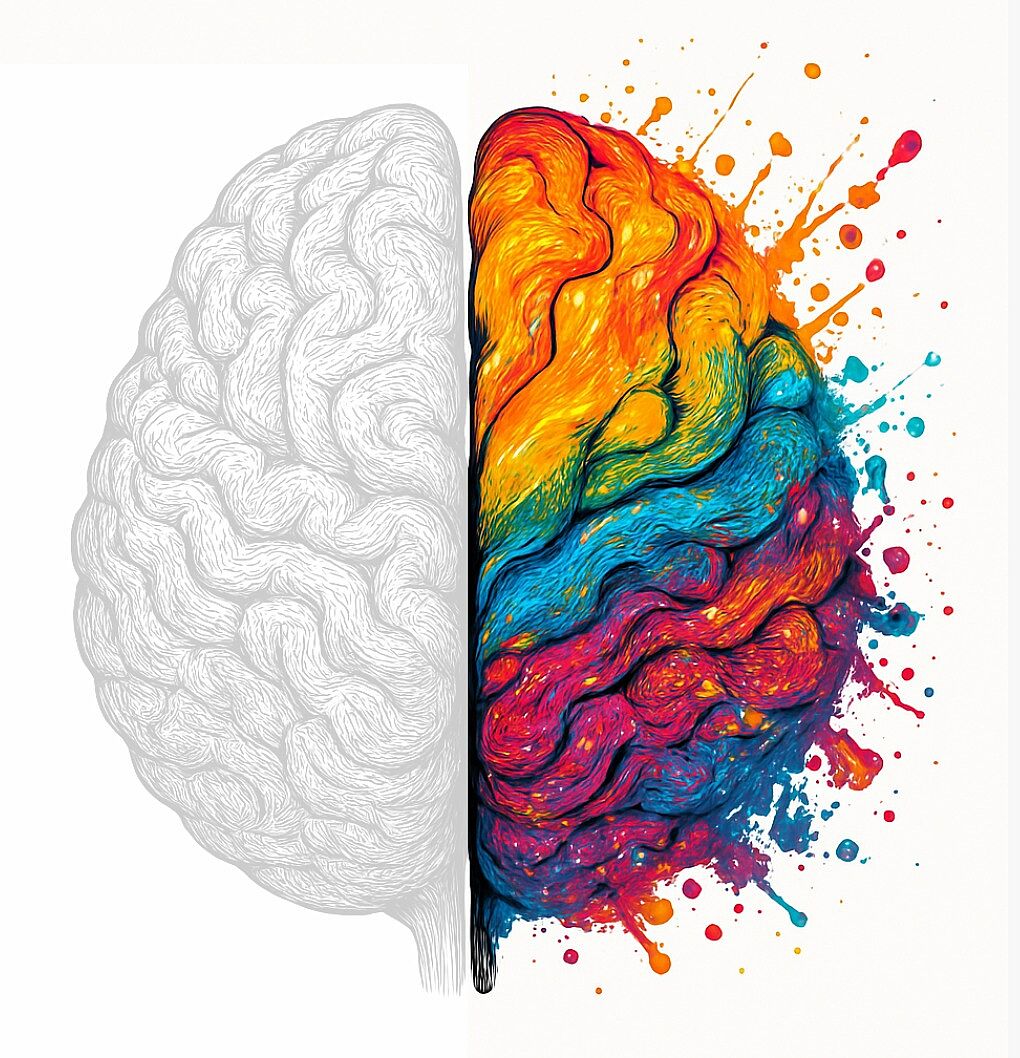
Picture: AI generated
[Event] Thriving, Not Just Surviving: Rethinking Mental Health in Academia
Tuesday, 13.05.2025, 15:00-17:45, UZAII, Lecture Hall 2 (2A122) and Eberhard-Clar-Saal (2B204)
Science, Stress, and Self-Care. In today's world, global crises, societal pressures, and the ever-growing demands of academic life make mental health more important than ever. Universities can be high-stress environments where challenges quickly add up-so how are students and researchers really coping? To better understand the situation at the University of Vienna, we conducted a survey, and we'll be sharing the results at this event. Psychologist Hannah Tschenett (University of Vienna), an expert in stress management, will provide insights into the science of stress and introduce practical techniques for healthy coping. Afterward, we'll put these techniques into practice together in a stress games workshop.
Programme:
- 15:00–16:30 Understanding Mental Health in Academia – open to all, Lecture Hall 2 (2A122)
- 15:00–15:10: Welcome
- 15:10–15:30: Motivation and Results of the Survey – Mariana Vallejo Velázquez, Xinxuan Xiang, Federica Mauro, Sandy Chkeir, Diana Hatzenbühler, Till Wenzel (VISESS)
- 15:30–16:30: Speaker Presentation – Hannah Tschenett (University of Vienna)
- 16:30–16:45: Break with snacks and drinks
- 16:45–17:45 Workshop on Practical Strategies to Improve Mental Health – registration required, Eberhard-Clar-Saal (2B204)
- 16:45 – 17:30: Stress Games Workshop
- 17:30 – 17:45: Final Remarks
Registration:
Registration for the workshop part was open until 9 May 2025 (priority for VISESS PhD students).
Organisers:
Mariana Vallejo Velázquez, Xinxuan Xiang, Federica Mauro, Sandy Chkeir, Diana Hatzenbühler, Till Wenzel
File size: 2.2 MB
18.02.2025: Diversity Event "Embracing Diversity in STEM"
[Event] Embracing Diversity in STEM
Tuesday, 18.02.2025 9:00-17:00, Main Ceremonial Hall, University of Vienna, Universitätsring 1
Creating a diverse scientific community is a key goal and challenge in today’s academic world. This full-day event highlights leading researchers and emphasizes the importance of diversity across culture, gender, LGBTQ+, and people with disabilities. Jointly organised by the Doctoral Schools of Chemistry, Earth and Space Sciences, Mathematics and Physics, it aims to explore the impact of diversity in science, the challenges faced by scientists from underrepresented groups, and steps to foster an inclusive environment in STEM. The event is aimed at all students and employees.
Speakers:
– Keynote by Prof. Anna Danielsson
– Science Talks by Prof. Chi Zhang, Prof. Mathea Sophia Galanski, Dr. Shantanu Dave & Prof. Nergis Mavalvala
– Science Slam by PhD students
Find more information here: embracing-diversity-stem.univie.ac.at
Find a review of the event here: doschem.univie.ac.at
File size: 7.7 MB
28.01.2025: Big Picture Event "How Can We Increase Resilience to Heat Under the Context of Climate Change?"
[Event] How Can We Increase Resilience to Heat Under the Context of Climate Change?
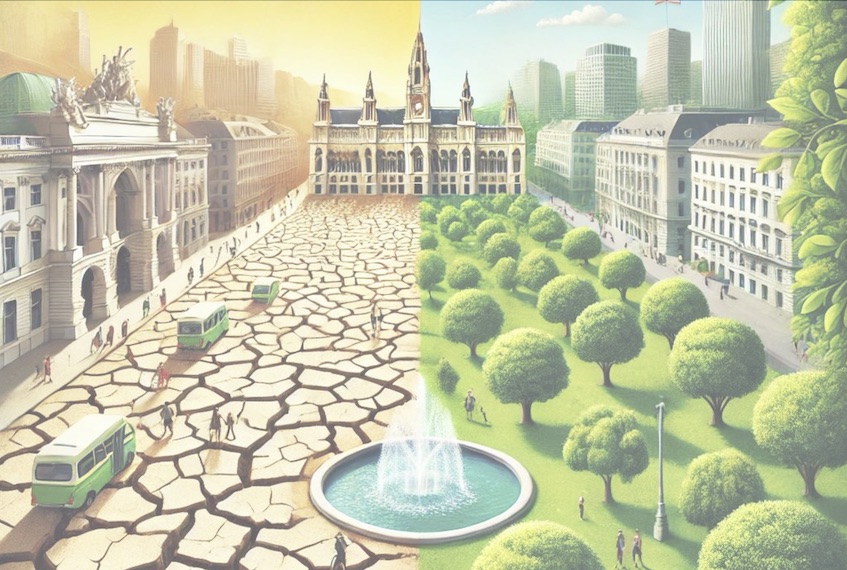
[Event] How Can We Increase Resilience to Heat Under the Context of Climate Change?
Tuesday, 28.01.2025, 15:00-18:00, UZA II, Lecture Hall 2 (2A122) and Eberhard-Clar-Saal (2B204)
As cities are faced with heatwaves which are increasing in frequency and intensity, inclusive, equitable, and just resilience strategies are vital. Accordingly, this VISESS seminar will provide an empowering space to co-create multifunctional strategies that illustrate how social, environmental, infrastructure, and institutional systems can improve their ability to cope with and adapt to the threat of heat waves induced climate change. Such will be accomplished through engaging lectures and an inspiring participatory systems mapping workshop, which both highlight the value in co-developing resilience strategies that are grounded in social and geographical contextual details, and can be holistically scaled through collaborative efforts.
Programme:
- 15:00 Event Welcome & Introduction
- 15:10 Expert Talks & Discussion
· Dr. Tanja Tötzer, Austrian Institute of Technology Thematic Coordinator Climate-Resilient Urban Pathways: How can we increase our resilience to climate change?
· Dipl.-Geogr. Dr. Simon Bunchuay-Peth, University of Vienna Department of Geography and Regional Research - Research Group Population, Environment, and Development: What role does local knowledge play in strengthening the resilience capacities in the face of rising temperatures?
· Dipl.-Ing. Jürgen Preiss, City of Vienna Municipal Department 22 (MA 22) - Environmental Protection in Vienna: Which measures does the City of Vienna take to prevent and mitigate the effects of Urban Heat Islands?
- 16:25 Get-together
- 16:40 Participatory Systems Mapping Workshop
- 17:50 Workshop Reflection and Wrap-up
- 18:00 End
Registration:
- Talks and discussion part: open for everyone, no registration needed
- Workshop part: registration is open until 26.01.2025.
Organisers:
Ioanna Evangelou, Alejandra Donato, Daria Tatsii, James Vandenberg, Jannik Kastrup, Kirill Grachev
File size: 649 kB
03.12.2024: Talk "System Change – Sex, Fire and the Tipping Point of Life in Earth History"
[Talk] System Change – Sex, Fire and the Tipping Point of Life in Earth History
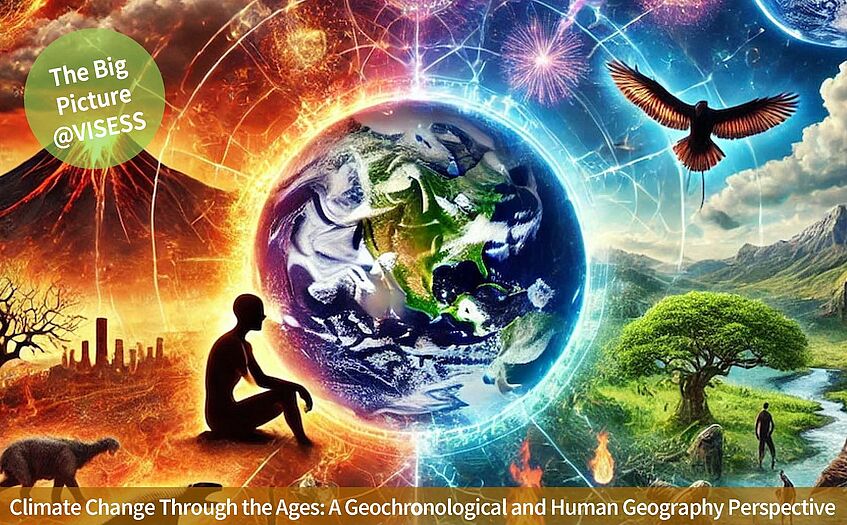
[Talk] System Change – Sex, Fire and the Tipping Point of Life in Earth History
Tuesday, 03.12.2024, 15:00-16:30, UZAII, Lecture Hall 2 (2A122)
Talk by Univ. Prof. Dr. Mathias Harzhauser, Head of the Geological and Palaeontological Department and curator of the paleobotanical collection at the Natural History Museum Vienna (NHM Vienna).
"System Change – Sex, Fire, and the Tipping Point of Life in Earth History" invites us to explore the profound and transformative forces that have shaped life on Earth. From the primordial sparks of fire that fueled the planet's evolution to the emergence of sexual reproduction as a driving force in biodiversity, these pivotal moments mark the thresholds of systemic change in Earth's history. This event delves into the interconnectedness of these phenomena, examining how they influenced the trajectory of ecosystems, climate, and life itself. By reflecting on these tipping points, we gain insights into the fragility and resilience of our planet, offering valuable lessons for navigating the challenges of the Anthropocene.
After the talk, join us for an opportunity to network over snacks and drinks.
Organisers:
Medina Adulyarat, Jiranan Homnan, Rakesh Subramanian, and Chao Guo
File size: 403 kB
12.11.2024: Workshop "VISESS Climate Fresk: Interactive Climate Education – Draw Your Climate Awareness"
[Workshop] VISESS Climate Fresk: Interactive Climate Education – Draw Your Climate Awareness

[Workshop] VISESS Climate Fresk: Interactive Climate Education – Draw Your Climate Awareness
Tuesday, 12.11.2024, 15:00-19:00, UZAII, Eberhard-Clar-Saal (2B204)
Are you curious about how human activities drive Climate Change and how these changes impact our future in return? This Climate Fresk workshop for the Faculty of Earth Sciences, Geography and Astronomy (FGGA) marks the kickoff of a series of events focused on the topic of Climate Change. Join us for an engaging and interactive session to explore and discuss the causes and consequences of Climate Change, guided by the latest scientific insights from the Intergovernmental Panel on Climate Change (IPCC) reports. Tap into your creativity to craft a beautiful Climate Fresk with your group. Share your experiences, thoughts, and emotions, and learn why now is the time to act. After the main event, enjoy refreshments and connect with other participants. In addition, participants will vote for the most creative fresk, awarding small prizes to the winners. This event is open to all FGGA students and staff, with a cap of 40 participants. Registration is open until the extended deadline 08.11.2024, 12:00 (capacity limited; first come, first serve). The event will be held exclusively in English to facilitate communication within the multicultural environment at the faculty.
Programme:
- 15.00-15.30 Welcome from the organizers and introduction to the Climate Fresk
- 15.30-18.30 Participation in the workshop
- 18.30-20.00 Refreshments and vote for the most creative Climate Fresk
Registration:
Registration is open until the extended deadline 08.11.2024, 12:00 (capacity limited; first come, first serve).
Organisers:
Laura Posch, Edoardo Carraro, Zheng Wang, Junwen Zhou
File size: 282 kB
28.05.2024: Big Picture Event "Out of the Box: Creativity in Research"
[Big Picture Event] Out of the Box: Creativity in Research
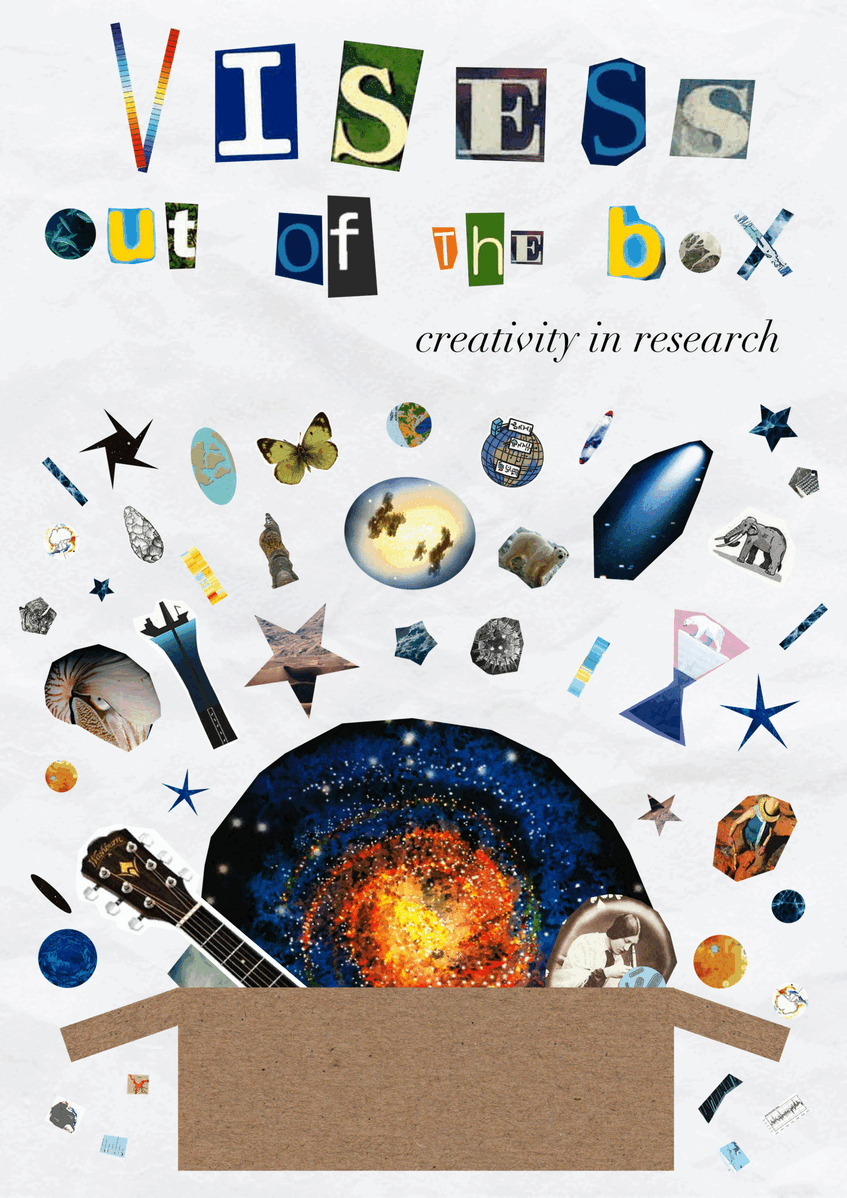
[Big Picture Event] Out of the Box: Creativity in Research
Tuesday, 28 May 2024, 16:45, Lecture Hall 2, UZA II, Floor 1, 2A122 & Online
Part of the “Big Picture” event series of the Vienna International School of Earth and Space Sciences (VISESS)
In cooperation with the Meteorological-Geophysical Colloquium at the University of Vienna
When conducting scientific research, there are many ways to go about it - but are there ways that can combine our academic interests with other passions or hobbies? What benefits can we gain from this as researchers? Can this also influence us on a more personal level? These are the questions that we look to answer in this event, as well as to encourage students (and even senior researchers) to think outside of the box, to explore more unconventional tools or methods to look at (and share) their work, and to bring even more joy into their research.
We will start with a video montage showing examples of how people from different fields and different places in the world achieve this. Then, our invited speakers, Matthew Pelowski and Ulrike Kuchner, will explore different aspects of creativity in research and its advantages, followed by a panel discussion. Finally, participants are welcome to join a workshop conducted by Daniela Brill Estrada, where they will be able to do a hands-on activity to think about and showcase their own research using mixed media (painting, poetry, clay sculpting). The works will be displayed at the Talks & Barbecue 2024 event of the Faculty of Earth Sciences, Geography and Astronomy (FGGA).
Programme:
- 16:45-18:15 Talks and discussion
- 16:45-16:50: Welcome (Ourania Kounadi, Vienna International School of Earth and Space Sciences)
- 16:50-16:55: General introduction
- 16:55-17:05: Cases of creativity (video montage)
- 17:05-17:20: Extraordinary tools: a (brief) discussion of the multifaceted impact and importance of arts (Matthew Pelowski, University of Vienna)
- 17:20-17:40: ArtScience: Creativity in research through art-science integration (Ulrike Kuchner, University of Nottingham)
- 17:40-18:00: Q&A and discussion
- 18:00-18:15: Get-together with snacks and drinks
- 18:15-20:00: Workshop (Daniela Brill Estrada, Johannes Kepler University Linz) (in person only)
Registration:
Registration for the workshop part closed on 17 May 2024.
Organisers:
Kamila Faizieva, Paula Granero Ordoñez, Paulina Mejías Osorio, Qilei Huang, Sarah Haghjoo, Stefanie Reiter
[Big Picture Event] Coloniality and the Struggle for Autonomy in Chilean Astronomy
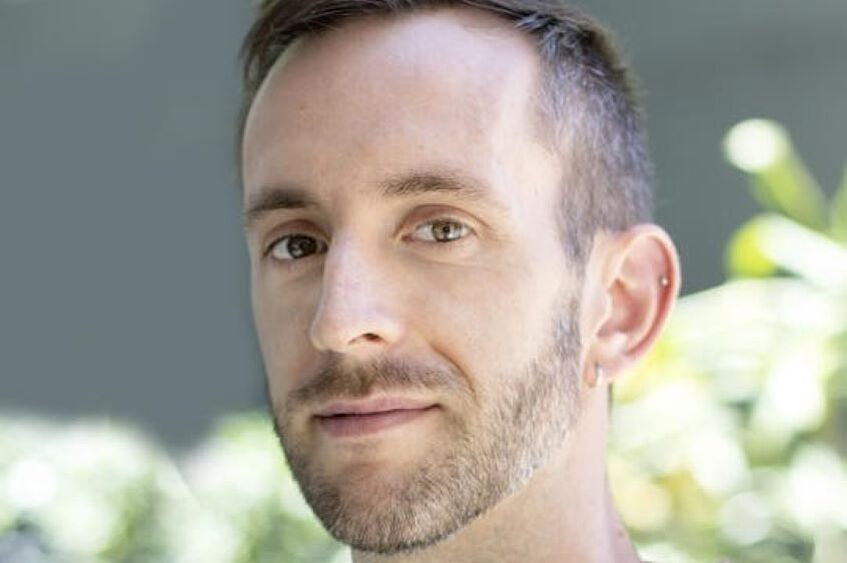
Photo: Sebastián Lehuedé | www.kcl.ac.uk
[Big Picture Event] Coloniality and the Struggle for Autonomy in Chilean Astronomy
Monday, 14 May 2024, 15:00, Department of Astrophysics, Lecture Hall, Türkenschanzstrasse 17, 1180 Vienna & Online
Part of the FGGA lecture series "Academia and In/Equality" / In cooperation with the Vienna Astro Colloquium
- Sebastián Lehuedé (University of Cambridge, Governance of digital technologies, global social justice, geopolitics of digital rights)
- Abstract: Sebastián Lehuedé is a Lecturer in Ethics, AI and Society at the Department of Digital Humanities, King's College London. His research focuses on the governance of digital technologies from a global social justice perspective. After conducting research on astronomy data in Chile, his current project looks at the environmental impact of Artificial Intelligence.
This presentation unpacks the concepts of coloniality and autonomy and discusses how they manifest in the governance of astronomy data in Chile. This case is of particular interest as many actors consider that the vast volumes of data produced by the numerous international observatories constructed in the Atacama Desert can bring about development and progress. The insights provided are supported by an analysis of empirical data (interviews and participant observation) collected in 2019 representing the view of astronomers, astroinformaticians, business managers and policy-makers envisioning initiatives regarding astronomy data, as well as Indigenous communities affected by the construction of an astronomical observatory. - Venue: Department of Astrophysics, Lecture Hall, Türkenschanzstrasse 17, 1180 Vienna (how to reach and site map) & Online-Stream
[Picture a Scientist] Mary Anne Holmes - Building a Path To Equity
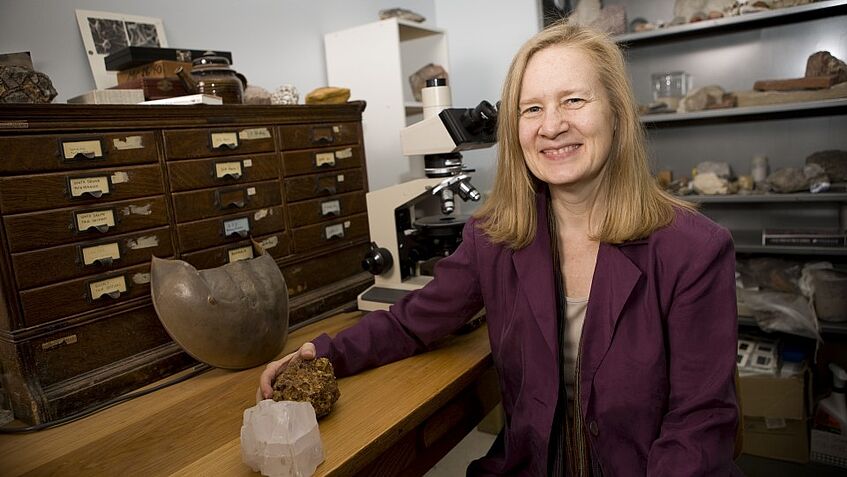
Photo: Mary Anne Holmes | University of Nebraska | news.unl.edu
[Picture a Scientist] Mary Anne Holmes - Building a Path To Equity
Monday, 15 April 2024, 15:00, Lecture Hall 3, UZA II, Floor 2, 2A211 & Online
Part of the FGGA lecture series "Academia and In/Equality" / Within the "Picture a Scientist" series of the Doctoral School VISESS / In cooperation with the EGU and the Culture and Equality Unit of the University of Vienna
- Mary Anne Holmes, awarded with the new "Champion(s) for Equality, Diversity, Inclusion-Awards" of the European Geosciences Union (EGU)
- Abstract: Mary Anne Holmes, emerit. professor of the Earth and Atmospheric Sciences Department at the University of Nebraska-Lincoln (UNL), clay and sediment studies; partnered with social scientists to address inequity in the geosciences. She will speak to data-driven methods that move us towards equity for all.
- Venue: Lecture Hall 2, UZA II, Floor 1, 2A122 & Online-Stream (Please register for online-participation here)
File size: 208 kB
12.12.2023: Big Picture Event "Bake your PhD!"
[Big Picture Event] Bake your PhD!
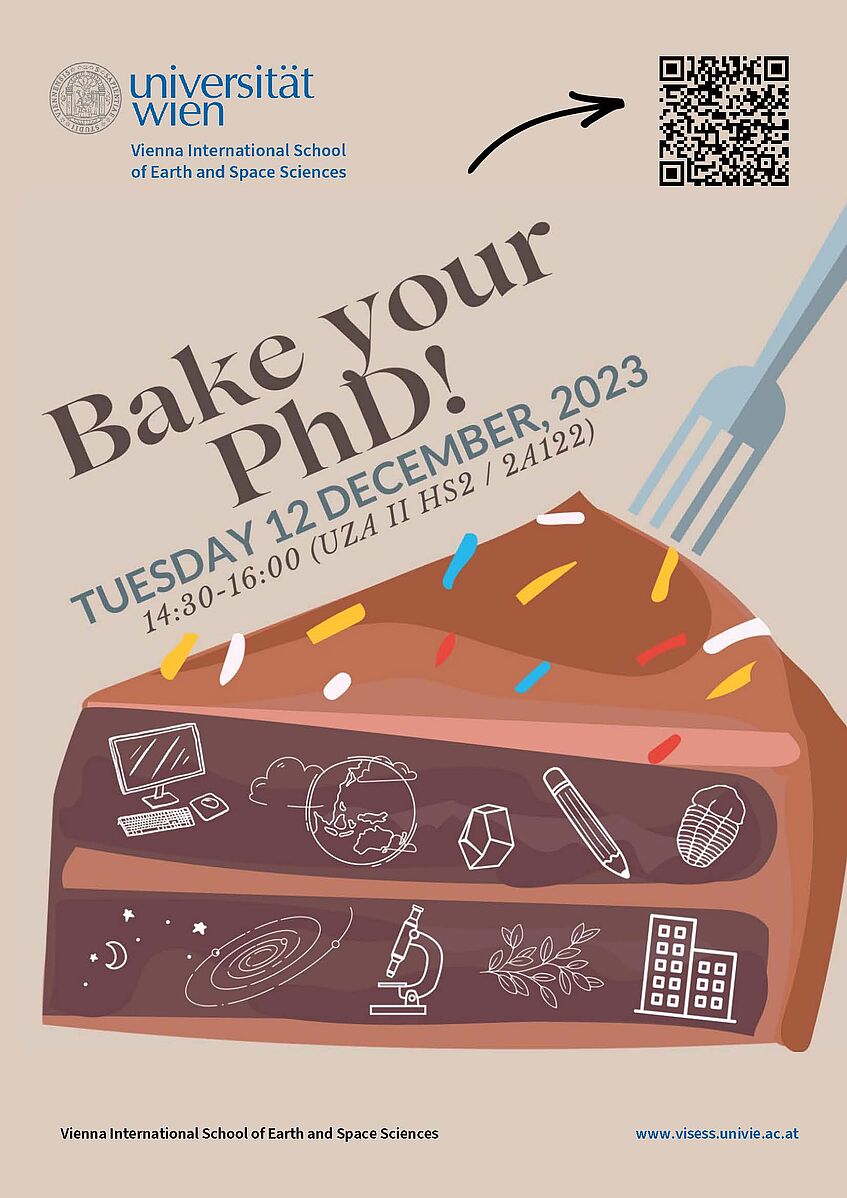
[Big Picture Event] Bake your PhD!
Tuesday, 12 December 2023, 14:30-16:00, UZAII Lecture Hall 2 (2A122), Josef-Holaubek-Platz 2, 1090 Vienna
Get ready to Bake your PhD!
- Be creative in the kitchen and make something (sweet or savory) that portrays your current research
- It is possible to participate individually or in groups
- Bring your cake/baked good to the event on 12 December 2023 and showcase your delicious research to fellow PhD students and supervisors
- Awards will be given out to those who excel in originality, taste, and in communicating/presenting the topic
- All VISESS colleagues are invited to come along to hear about and taste exciting research
- So start planning your creation and join us on 12 December 2023 for an afternoon of sharing your science, food and drinks!
Make sure to register before 6 December via the registration form.
Organisers: Paulina Mejías Osorio, Simon Schleich, Lukas Winkler (VISESS PhD Board)
File size: 232 kB
18.04.2023: Big Picture Event "The PLEES Index & Effectively Communicating on Climate Change"
[Big Picture Event] The PLEES Index & Effectively Communicating on Climate Change
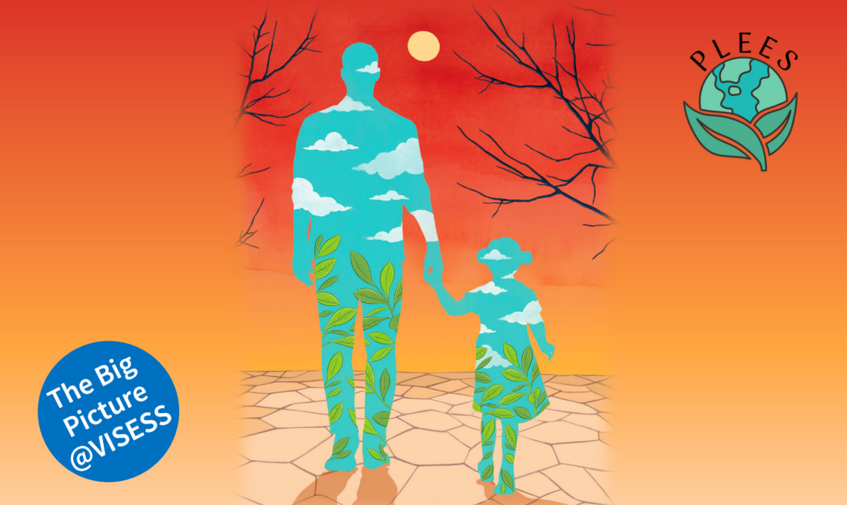
Illustration: Stephanie Singleton
[Big Picture Event] The PLEES Index & Effectively Communicating on Climate Change
18 April 2023, 17:00-19:00, UZAII Lecture Hall 3 (2A211) and Online. Many thanks to 115 registered participants!
In cooperation with the Meteorological-Geophysical Colloquium at the University of Vienna
Climate change is one of the biggest threats modern generations have to face. To ensure a liveable future, urgent measures should be taken. One of the best ways to obtain such quick change in our society is by informing citizens, to engage them, and try to reach the social tipping point as fast as possible. We constructed the PLEES index. This index is based on Maslow's hierarchy of needs and is projected under different climate change scenarios, to quantify the psychological, social, and economical impact of climate change in the world. This index is a visual tool, easily distributable in social medias, aiming to inform people about climate change, targeting wealthier European countries, with financial and political means to generate a positive change, showing that their life comfort is at risk. We believe that popularising the idea of social tipping point is a good way to show that big changes can happen very fast if citizens act together. During this event, we will introduce the PLEES index. The presentation will be followed by a panel discussion on how to effectively communicate on climate change.
Programme:
- 17:00 – 17:05 Welcome (VISESS Director Glenn van de Ven)
- 17:05 – 17:50 The PLEES Index (Gwenaël Van Looveren, Laurane Fréour, Paula Granero, Tadeja Veršič)
- 17:50 – 18:00 Break
- 18:00 – 18:45 Panel Discussion: Effectively Communicating on Climate Change (Nina Vaupotič, Aiko Voigt, Benjamin Bertaux, Laurane Fréour | Moderation: Alice Zocchi)
- 18:45 Get-together
Language: English
Participation is free and open for everybody who is interested. Register here!
In the run-up to the event, the organisers have written a blog post that gives a few insights into their project and the planned event – read here!
Organisers: Gwenaël Van Looveren, Laurane Fréour, Paula Granero, Tadeja Veršič
23.02.2023: Big Picture Talk "Graveyard of Space Technology – The Problem of Space Junk"
[Big Picture Talk] Graveyard of Space Technology - The Problem of Space Junk
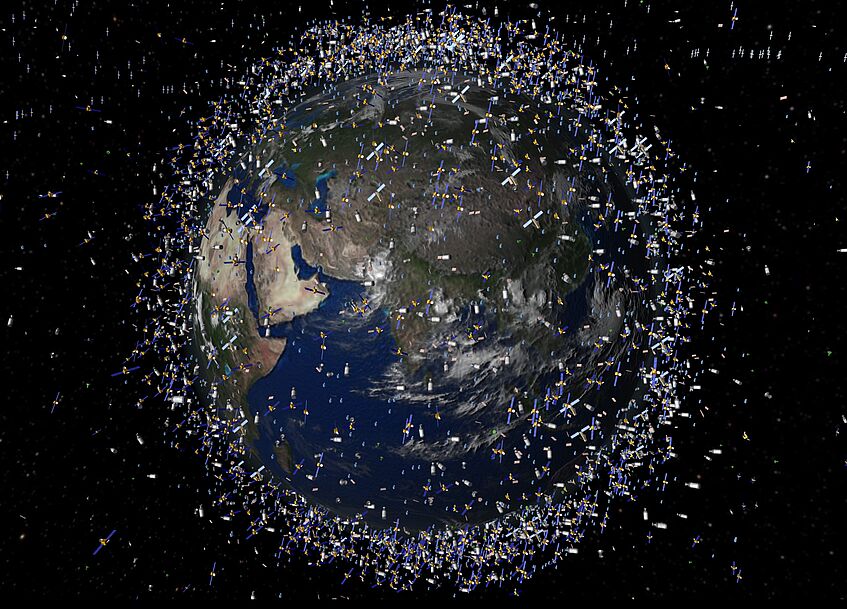
Photo: © European Space Agency - ESA
[Big Picture Talk] Graveyard of Space Technology - The Problem of Space Junk
23 February 2023, 17:00-19:30, UZAII Lecture Hall 3 (2A211) and Online
The Space Age, a new chapter in human history opened with the launch of Sputnik 1 satellite in 1957. Fast forward to 2023 and the number of operating satellites is steadily rising towards 10,000. Given the vastness of space, it is hard to imagine that man-made objects could reach numbers high enough to disturb Earth’s orbits to such a degree as to jeopardize our daily lives and the future of space exploration. With the modern space race under way Earth’s orbits will only become more “congested, contested and competitive.” The consequence of such actions gives rise to space debris – any object of human origin, beyond anyone’s control – with the potential to damage or destroy upon impact. In 1978, a NASA expert, Donald J. Kessler, predicted that past a certain critical point, the amount of space debris will keep on increasing exponentially. What are the dangers posed by space debris? Is it an issue that should concern us? Can we simply clean up space?
Programme:
- 17:00–17:05 Welcome (Alvaro Hacar Gonzalez, VISESS Representative)
- 17:05–17:35 What is Space Debris? (Michael Steindorfer, Austrian Academy of Sciences)
- 17:35–18:05 Cleaning up Space (Antonio Caiazzo, ESA Clean Space Office)
- 18:05–18:35 Legal Aspects of Space Debris (Annie Kazarjan, University of Vienna)
- 18:35–18:50 Break
- 18:50–19:30 Panel Discussion: The Future of Space Debris (Moderation: Agata Wisłocka, University of Vienna)
Language: English
Participation is free and open for everybody who is interested. Register here!
Organisers: Agata Wisłocka, Gwenaël Van Looveren, Vlad Răstău, Richard Kramer, Simon Schleich, Lukas Winkler
14.02.2022: Big Picture Talk "The Weakening of the Gulf Stream"
[Big Picture Talk] The Weakening of the Gulf Stream: Past, Present, and Future of Europe
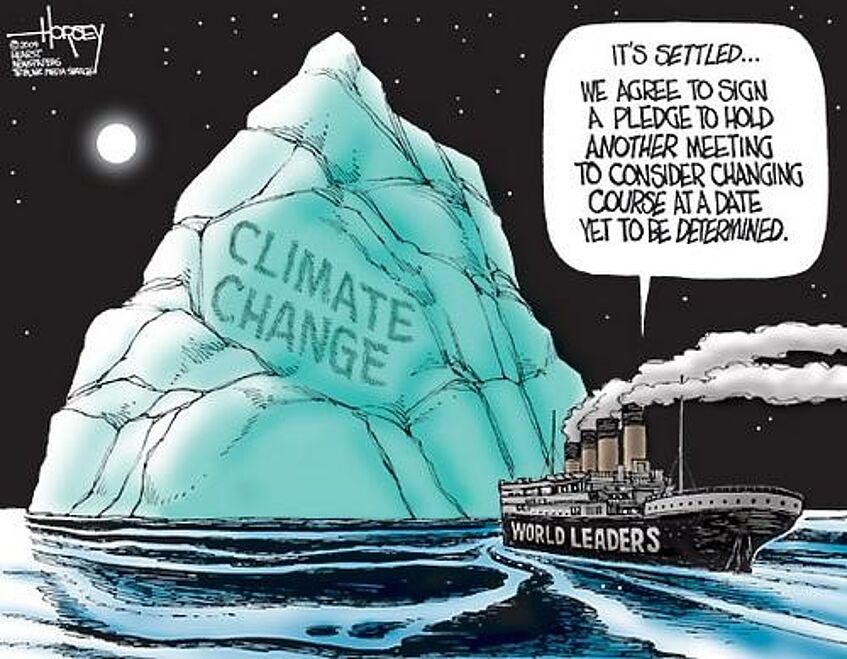
Cartoon: David Horsey | Tribune Content Agency
[Big Picture Talk] The Weakening of the Gulf Stream: Past, Present, and Future of Europe
14 June 2022, 17:00-19:00, Online (Zoom)
Will the weakened Gulf Stream impact the European climate? How did society react in the past when faced with similar big scale challenges? What are the potential drivers of change that social movements ask for consideration by politicians? These are a few of the questions that we asked ourselves when we started to think about the topic of the talk. The event will cover the Gulf Stream weakening as a starting point. The Gulf Stream, as part of the global ocean circulation system (AMOC, Atlantic Meridional Overturning Circulation), is a 100 km wide and 800-1200m deep ocean current. By leading warm, saline water to the North-eastern Europe (Nord Atlantic current) and Western Africa (Canary current), it brings substantial warming to our latitudes. The weakening of the Gulf Stream will bring major disruptions from our current living conditions, and we use it as a climatic event leading to the broader societal issues that we are facing. The talk aims specifically to examine the societal effects of environmental change and how to deal with them from perspectives of three scientific fields including, natural science, history, and social movements.
Programme:
- 17:00–17:05 Welcome speech (Leopold Haimberger, FGGA Vice-Dean, University of Vienna)
- 17:05–18:10 The societal effects of the weakening Gulf Stream and related environmental change
- The effect of Gulf Stream changes on the climate in North West Europe
(David Thornalley, University College London) - The effects of previous climatic changes on humanity
(Johannes Preiser-Kapeller, Austrian Academy of Sciences) - The effect of climate change events on civil society - how can we exchange the roles?
(Claire Lejeune, Sciences Po Paris)
- The effect of Gulf Stream changes on the climate in North West Europe
- 18:10–18:15 Short break
- 18:15–18:55 Panel discussion followed by Q&A (Harald Sterly, University of Vienna (Moderator))
- 18:55–19:00 Summary and concluding thoughts
Language: English
Participation is free and open for everybody who is interested.
Organisers: Christine Kroisleitner, Coline Garcia, Lemlem Fitwi Weldemariam, Mongkon Thongchaithanawut, and Reena Tadee
03.-04.05.2022: Picture a Scientist "Jocelyn Bell Burnell"
[Picture a Scientist] Jocelyn Bell Burnell
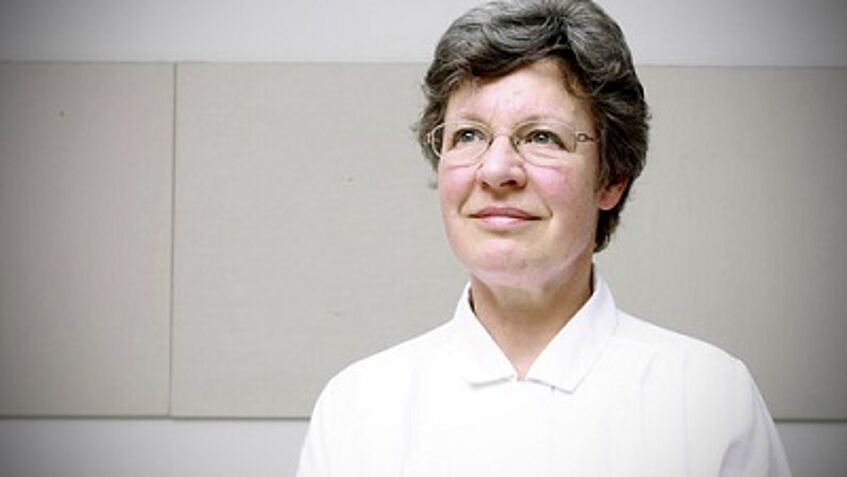
Dame Jocelyn Bell Burnell | © DIPCehu
[Picture a Scientist] Jocelyn Bell Burnell
3 May 2022, 15:30, UZAII Lecture Hall 3 (in person)
4 May 2022, 10:00-14:00, Department of Astrophysics (in person) Many thanks to 100 participants!
With the discovery of pulsars, astrophysicist Dame Jocelyn Bell Burnell transformed astronomy, and so does her inspiring career and engagement in the history of women and minorities in science. As a PhD student in radio astronomy, Jocelyn Bell Burnell was the first to observe and analyse radio pulsars, which led to the Nobel Prize in Physics for her supervisor in 1974. Jocelyn Bell Burnell in the following made an outstanding and inspiring high-profile career, becoming one of the leading female astrophysicists – working part-time for many years while raising her son. She was the first female person in several leading scientific positions and received countless awards and honors. Besides, Jocelyn Bell Burnell has been constantly advocating for women and minorities in science. In 2018, she was awarded the Special Breakthrough Prize in Fundamental Physics, a major scientific award, for fundamental contributions to the discovery of pulsars, and a lifetime of inspiring leadership in the scientific community.
In the frame of this Big Picture event, Jocelyn Bell Burnell will talk about her career path and engagement to improve the position of women and other minorities in science. Furthermore, students and early career researchers of the Faculty will have the chance to join interactive sessions with Jocelyn Bell Burnell on topics like ‘Women and minorities in academia’, ‘Navigating academia and the nomadic lifestyle’ and ‘Career development and fighting the windmills’.
Programme:
3 May 2022, 15:30, UZAII Lecture Hall 3 (in person)
- Talk by Jocelyn Bell Burnell: Careering through astronomy
“In this talk I will describe my "career" path - not a conventional career, but rich nevertheless. I will also describe the work I have done to improve the position of women and other minorities in science departments in UK universities.”
Welcome and moderation: Anahí Caldu-Primo.
The talk is open to all interested participants. No registration required.
4 May 2022, 10:00-14:00, Department of Astrophysics, Observatory (in person)
- Interactive sessions with Jocelyn Bell Burnell for students and early career researchers
- Women and minorities in academia (Belonging to and building diverse academic community) (Moderation: Sümeyye Suri)
- Navigating academia and the nomadic lifestyle (Moderation: Núria Miret Roig)
- Career development and fighting the windmills (Moderation: Fabian Polnitzky)
Each session will be around 45 min with breaks in between for coffee and lunch. The sessions will take place in person at the Department of Astrophysics. The room will be announced prior to the sessions. Registration for the interactive sessions on 4 May 2022 was possible until Friday 29 April 2022.
Language: the event will be held in English.
Covid-19 regulations: FFP2 masks are required indoors.
Organisers: Sudeshna Boro Saikia, Christine Ackerl, Anahí Caldú, Martina Egger, Josefa Grossschedl, Florian List, Ryan Leaman, Tadeja Versic
This event is jointly organised by the Department of Astrophysics and the Vienna International School of Earth and Space Sciences.
"Picture a Scientist" Event Series at FGGA 2022S
"Picture a Scientist" event series at FGGA in summer semester 2022
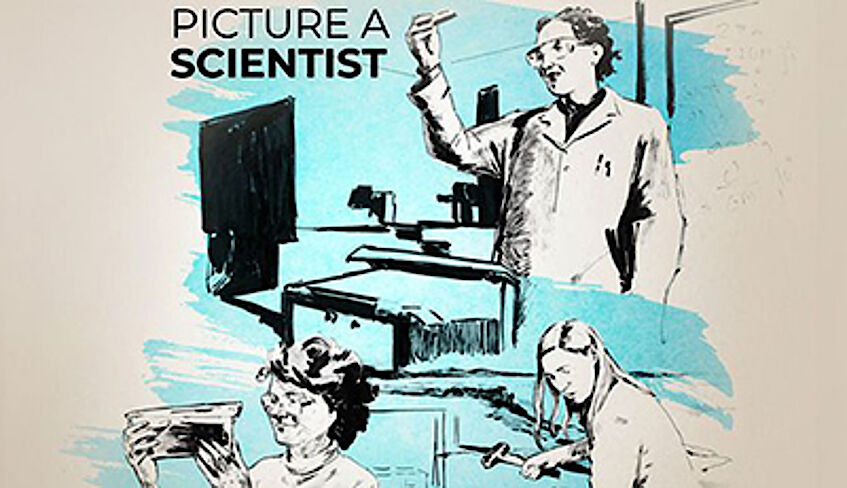
Image: © Picture a Scientist
"Picture a Scientist" event series at FGGA in summer semester 2022
Under the heading "Picture a Scientist", several events are planned at the Faculty of Earth Sciences, Geography and Astronomy for summer term 2022 (see FGGA website):
- 3-4 May 2022: Big Picture event and interactive sessions with Jocelyn Bell Burnell
- May 2022: Online screening of the movie “Picture a Scientist”
- 24 May 2022: Panel discussion with Dean Petra Heinz, geophysicist Chi Zhang, geographer Elisabeth Aufhauser, VISESS PhD student Christine Ackerl, Sylwia Bukowska (Head of UNIVIE Department of Equality and Diversity)
[Big Picture Talk] The Story of Water: Origins in Space, Travels on Earth and Impacts on People
01.03.2022: Big Picture Talk "The Story of Water: Origins in Space, Travels on Earth and Impacts on People"
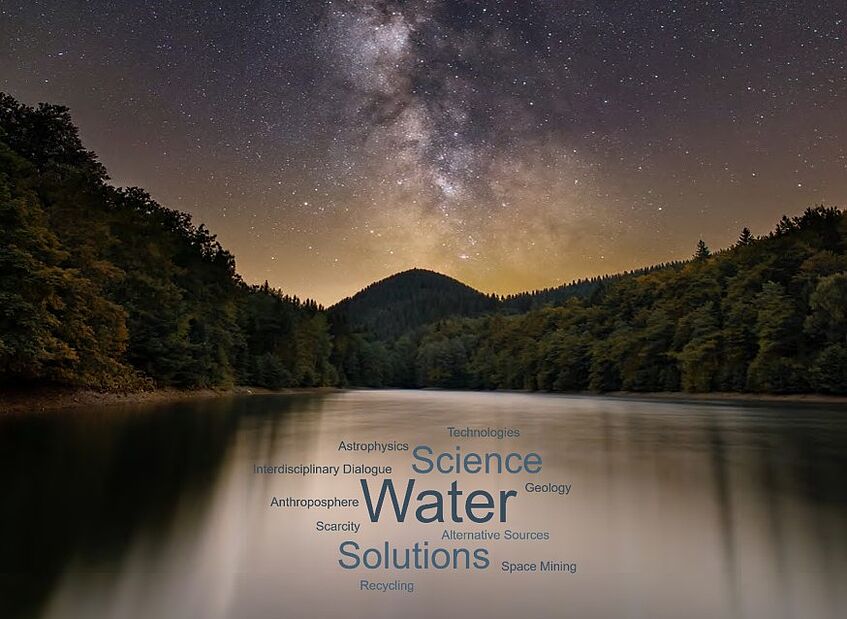
Photo: Evgeni Tcherkasski | Pixabay
01.03.2022: Big Picture Talk "The Story of Water: Origins in Space, Travels on Earth and Impacts on People"
Tuesday, 1 March 2022, 18:30-21:30, UZAII Lecture Hall 3 & Online (Zoom). Many thanks to 150 participants!
How can inter- and transdisciplinary scientific collaboration address the grand challenges that humanity faces? With this public event, we aim to connect different fields of expertise, ranging from Astrophysics to Earth Sciences and Human Geography, through the story of water, its origins in space, travels on Earth and impacts on people and present this topic to the interested public.
The event will take the participants on a journey through the story of water, guided by three leading experts who will share their views on the evolution of water resources. It begins in space, as we plan to uncover where water originates and how it eventually ended up on our planet. It will further take us to icy glaciers that have been shaping the Earth for eons and will finish with an exploration of the interaction between water and society through human innovations. Finally, a panel discussion will combine insights from the speakers, focusing on the future of water on Earth and beyond.
Date: Tuesday, 1 March 2022, 18:30 - 21:30
Venue: University of Vienna, UZAII, Lecture Hall 3 (2A211 2.OG UZAII Geo-Zentrum), Althanstraße 14, 1090 Vienna & Online (Zoom)
Programme:
- 18:30 Welcome & Introduction (VISESS Director Franz Kerschbaum & Organisers)
- 18:40 Talks
- The Origin of Water in Space (Ewine van Dishoeck, University of Leiden)
- Travels on Earth (Bethan Davies, Royal Holloway, University of London)
- Impacts on People (Christian Binz, Eawag, Switzerland)
- 20:10 Break
- 20:30 Panel Discussion
- The Future of Water: Where and How to Find Solutions? (Moderation: Sabine Kraushaar, University of Vienna)
Language: The event will be in English.
Covid-19 regulations: valid 3G proof, FFP2 masks indoor + outdoor in case minimum distance cannot be guaranteed.
Scientific Organising Committee of the VISESS Doctoral School:
Tadeja Veršič, Bianca Ciocan, Horst Foidl, Leonard Lemke and Stefano Peres
16.-17.06.2021: Big Picture Talk "Science Communication: Challenges and Opportunities"
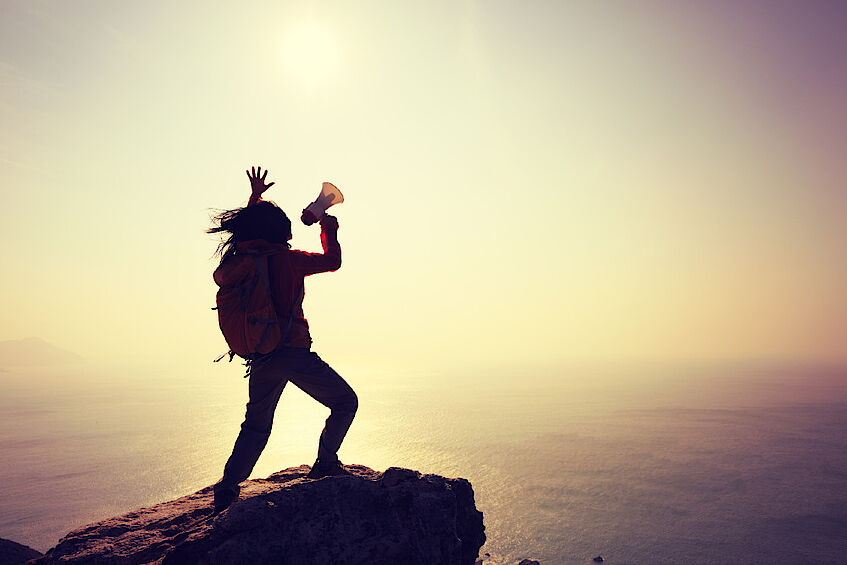
16.-17.06.2021: Big Picture Talk "Science Communication: Challenges and Opportunities"
The 2-day panel discussion was held on 16-17 June 2021, 19:00-20:30 (online). Many thanks to more than 80 participants!
The current worldwide situation has once more shown that the (mis-)representation of science in the media has the potential to impact and shape public opinions. This illustrates even more the necessity and value of proper science outreach work. However, especially for young researchers, there are many open questions about science communication and public outreach, such as:
- Which impact do we and should we as (young) researchers have on public opinions?
- What are the current and future social challenges for science communication and how can we overcome them?
- How can we communicate science in a fair and inclusive way, regarding social inequalities?
- How should we deal with mis-representation of science in the media?
- How can we communicate understandably while being scientifically correct?
- Which opportunities does science communication offer for (young) researchers?
This meeting shall provide an interdisciplinary discussion platform for both young and experienced researchers and science communicators to address these and other important questions. Participation is free and open for all levels of experience.
Day 1: Influence of science communication on society: Modern challenges and responsibilities
Welcoming words by Vice-Rector Jean-Robert Tyran and VISESS director Franz Kerschbaum
- Joao Alves, Faculty vice dean (FGGA), professor of stellar astrophysics (University of Vienna)
- Florian Freistetter, Science Busters, blogger, book author
- Karoline Iber, Director of the Children’s Office (Kinderbüro, University of Vienna)
- Christian Köberl, Former director of NHM Wien, professor of planetary geology (University of Vienna)
- Elisabeth Oberzaucher, Science Busters, behavioural biologist (University of Vienna)
Moderation: Christine Ackerl
Day 2: Opportunities and obstacles for young researchers: Why and how to participate in public outreach?
- Ruth Grützbauch, Founder and head of Public Space
- Caroline Haidacher, Responsible for ORF broadcast Universum History
- Gabor Herbst-Kiss, Head of digital planetarium, NHM Wien
- Hanna Möller, Public Relations, University of Vienna
- Stefan Wallner, Astronomy To Go, Outreach for Department of Astrophysics (University of Vienna)
- Heidi Weinhäupl, Faculty communication (FGGA, University of Vienna)
Moderation: Daniel Raithofer
Organisers:
Christine Ackerl, David Andreas Heuser, Marianne Sophie Hollinetz, Daniel Raithofer
[Big Picture Talk] The exoplanet revolution
Professor Didier Queloz (Nobel laureate 2019)
University of Cambridge, University of Geneva
Over the past 25 years, spectacular discoveries of exoplanet systems have modified our perspective on planet formation as a whole and, more specifically, our place in the Universe. Nobel Laureate Didier Queloz, who discovered the first exoplanet in 1995, will introduce the audience to the diversity of exoplanets and describe what we have learnt about their structure and formation mechanisms. Based on recent work about the origin of life on Earth, he is going to present new perspectives about the minimum conditions required to form the chemical building blocks of life. In this talk he will also explore a possible pathway to detect Earth-like systems amenable for future work on the origins of life.
Curriculum Vitae of Prof. Queloz
The event was planned for Friday, September 25, 2020, but had to be postponed due to the Covid-19-situation. We will inform you about the new date!
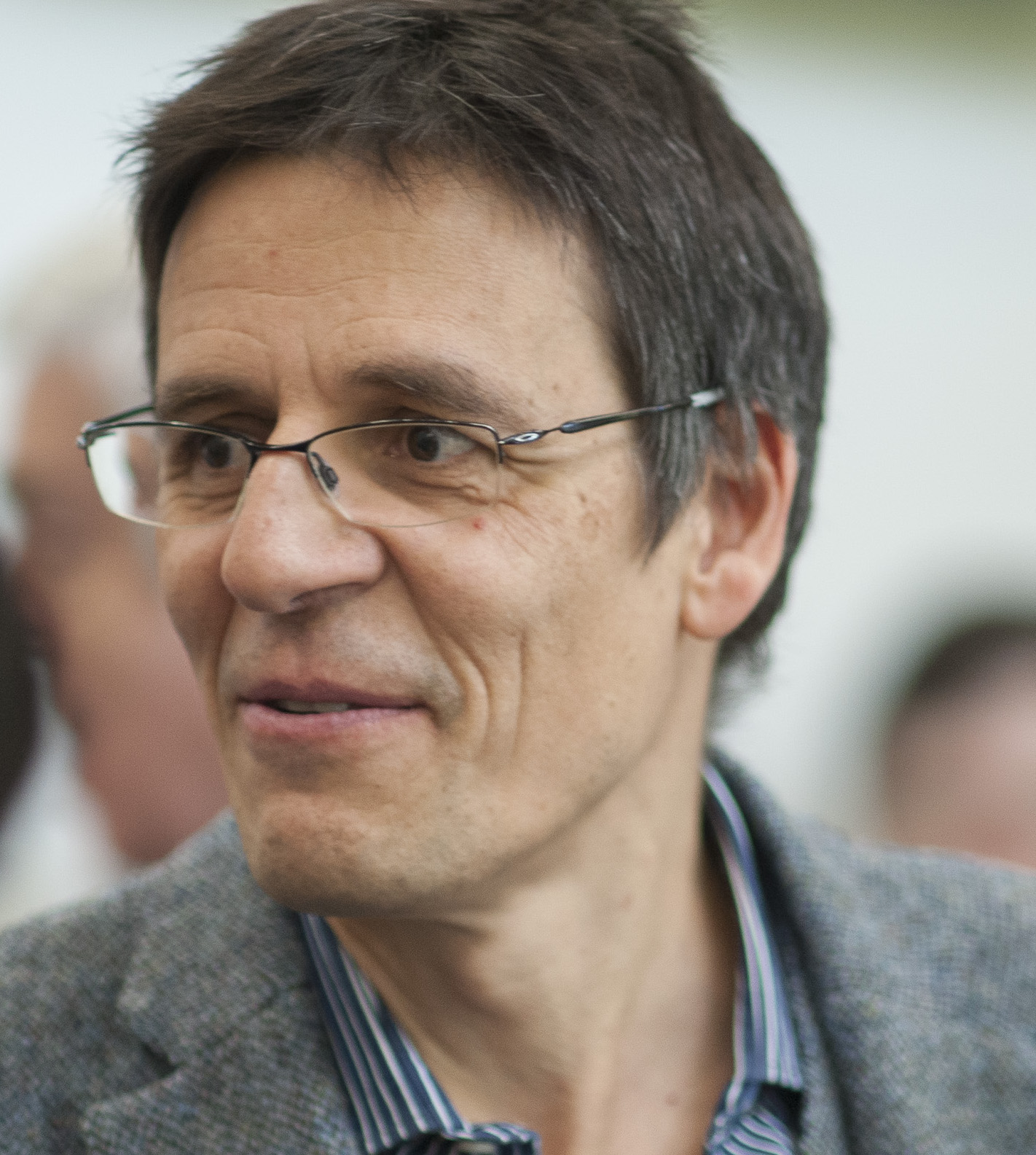
Didier Queloz, 2019 (privat)

